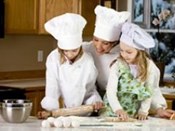1. Always wash hands before (and after) food preparation. Not only do you carry germs on your hands, but there can be harmful items that you are preparing.
2. Wash hands during food preparation, especially after handling items like raw meat and eggs. As a general rule, let them know that it’s a great idea to wash their hands many times during food prep.
3. Don’t use the same knives or cutting boards (during the same session of food preparation) for raw meat and for other items (such as fruits and vegetables.)
4. Fruits and vegetables should be washed prior to use. This even includes things that you might not expect, such as watermelon. (Otherwise, you could drag your knife along the rind, pick up bacteria on the knife, and then slice that into the fruit. Blech!)
5. Hot foods should be kept hot, and cold foods should be kept cold. If a food has been sitting out for more than two hours (that is supposed to be hot or cold), you will need to get rid of it. (Teach them that this is because microorganisms will grow on the food, and could make you sick.)
6. When thawing food, it’s safest to do it either overnight in the refrigerator or in cold water (that stays cold the whole time, so it means the need to change the water).
7. When using knives, always cut away from you. Children have a tendency to try to cut in a way that is very comfortable, which sometimes means they want to cut toward themselves. Teach them all about proper knife holding and usage.
8. When you cook something on the stove top that has a lid, teach children to open the lid away from them. To help them remember, you could have them put their hand far above the steam (with your supervision) to see how hot steam can be. Tell them to imagine how hot that would be much closer and right in their face.
9. Work with your children (of reading age) with recipes. Help them to follow directions carefully, as not following them can sometimes pose a risk to their safety or your family’s health. (Of course, as they get older, you can teach them that sometimes, it’s not important to follow directions exactly, as some recipes are perfectly okay to change.)
10. Teach them that, while baked good doughs may smell amazing, if they have raw eggs in them, it’s just not safe to eat them. Instead, tell them that you can work on making some eggless cookie dough to eat raw in place of what they actually wanted to sample.







